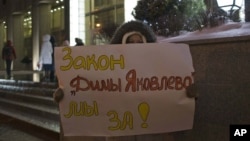MOSCOW —
Russia’s upper house of parliament has passed an amendment that would ban Americans from adopting Russian children. The measure still has to be signed by Russian President Vladimir Putin before it becomes law.
All 143 members of Russia’s Federation Council voted in support of the Dima Yakovlev bill that has sparked criticism from the United States and Russian activists.
Yakovlev was a Russian toddler who was adopted by an American couple in 2008. The boy later died when his father left him in a sweltering car for hours. The father was found not guilty of involuntary manslaughter.
Russian retaliation
The bill is part of a larger measure created by Russian lawmakers in response to the United States Congress’ passage of the so-called Magnitsky Act. The act bars entry and freezes the assets of Russian citizens accused of violating human rights. The act was named after Sergei Magnitsky a lawyer who allegedly uncovered massive fraud by Russian officials. Magnitsky died in jail pending corruption charges.
Ruslan Gattarov, a member of the Russian upper house, said the Russian response was a necessary one. He said the bill is an undoubtedly emotional response to the Magnitsky Act that violates many international norms. He said the upper house’s response to the act is adequate.
Russian President Vladimir Putin also has called the bill an adequate response to the Magnitsky Act. Putin says that Americans have not been taking care of the Russian children they adopt, going on to say that many have been killed after being adopted by Americans.
More than 60,000 Russian children have been adopted by Americans since the collapse of the Soviet Union in 1991. Twenty of those children died after being adopted.
Russian upper house member Andrei Klishas said those facts are not acceptable and that Moscow had to take action. He said the measure also includes a ban on organizations that assist in the adoption of children from Russia to the United States, claiming the ban would not allow such organizations to operate in Russia.
Expressing doubt
There are, however, some Russian officials who are against the measure, including Russian Foreign Minister Sergei Lavrov, who said it is a bad idea.
Many Russian children who have been adopted by Americans have severe disabilities. Many analysts and activists say that Russia does not have the infrastructure or facilities to take care of these children and that adoptions by American’s should not be banned.
Calls to several agencies who assist Americans in the adoption process of Russian children were not returned.
According to UNICEF [United Nation's Children's Fund], more than 700,000 children do not have parents in Russia. If Putin signs the bill into law, 46 children about to be adopted by Americans would remain in Russia.
Russian news agencies report Putin is expected to consider the law within the next two weeks.
All 143 members of Russia’s Federation Council voted in support of the Dima Yakovlev bill that has sparked criticism from the United States and Russian activists.
Yakovlev was a Russian toddler who was adopted by an American couple in 2008. The boy later died when his father left him in a sweltering car for hours. The father was found not guilty of involuntary manslaughter.
Russian retaliation
The bill is part of a larger measure created by Russian lawmakers in response to the United States Congress’ passage of the so-called Magnitsky Act. The act bars entry and freezes the assets of Russian citizens accused of violating human rights. The act was named after Sergei Magnitsky a lawyer who allegedly uncovered massive fraud by Russian officials. Magnitsky died in jail pending corruption charges.
Ruslan Gattarov, a member of the Russian upper house, said the Russian response was a necessary one. He said the bill is an undoubtedly emotional response to the Magnitsky Act that violates many international norms. He said the upper house’s response to the act is adequate.
Russian President Vladimir Putin also has called the bill an adequate response to the Magnitsky Act. Putin says that Americans have not been taking care of the Russian children they adopt, going on to say that many have been killed after being adopted by Americans.
More than 60,000 Russian children have been adopted by Americans since the collapse of the Soviet Union in 1991. Twenty of those children died after being adopted.
Russian upper house member Andrei Klishas said those facts are not acceptable and that Moscow had to take action. He said the measure also includes a ban on organizations that assist in the adoption of children from Russia to the United States, claiming the ban would not allow such organizations to operate in Russia.
Expressing doubt
There are, however, some Russian officials who are against the measure, including Russian Foreign Minister Sergei Lavrov, who said it is a bad idea.
Many Russian children who have been adopted by Americans have severe disabilities. Many analysts and activists say that Russia does not have the infrastructure or facilities to take care of these children and that adoptions by American’s should not be banned.
Calls to several agencies who assist Americans in the adoption process of Russian children were not returned.
According to UNICEF [United Nation's Children's Fund], more than 700,000 children do not have parents in Russia. If Putin signs the bill into law, 46 children about to be adopted by Americans would remain in Russia.
Russian news agencies report Putin is expected to consider the law within the next two weeks.




